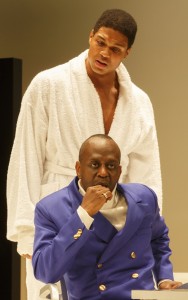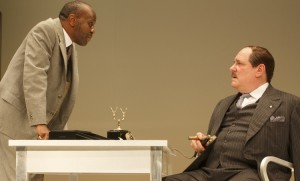The title of Will Power’s new play, Fetch Clay, Make Man, has fascinating echoes. It refers directly to its two protagonists, boxer Cassius Clay and Stepin Fetchit, the Hollywood film actor of the 1930s and ’40s whose portrayal of shiftless, lazy Negroes earned him widespread contempt. But the syntax of the title also brings to mind the creation story of the golem. The words themselves might be a mantra for its creator, and it's linked to Power’s theme: the American obsession with reinventing oneself, and the impossibility of escaping the past.
Set in 1965 in the week of a crucial boxing match with Sonny Liston, the play begins with Ali's summoning Fetchit to his Maine training camp. Reinvention is everywhere: Negroes are calling themselves blacks. Clay had just rechristened himself Muhammad Ali after joining the Nation of Islam. His intimates include Brother Rashid (John Earl Jelks), a security chief with a past, and Sonji, his young wife, who rebels against Islamic strictures. In flashbacks we also meet William Fox (Richard Masur), the Eastern European Jew who founded Fox Pictures, which put Fetchit under contract for movies such as John Ford’s Steamboat Round the Bend, with Will Rogers, and Dimples, with Shirley Temple.
Power lets Fetchit make the case (as he did late in life) that his shiftless, whining character was actually subversive: he was being paid to work and by wiggling out of it, he actually forced white people to do the labor instead. But even through that lens it’s hard to discern a positive spin in the role, and it's likely director Des McAnuff avoids using any clips of Fetchit on film because viewers would find him less sympathetic with firsthand experience of his embarrassing portrayals.
Designer Riccardo Hernandez has set the action on a large, sterile, raised square, with the audience on three sides — a training room in Lewiston, Maine. Fetchit (his real name was Lincoln Perry) enters this arena with just a hint of subservience, and he even does a brief shuck-and-jive movement to persuade Ali that it’s really him. Gradually, though, as Fetchit realizes Ali may be his ticket to redemption, he hatches big plans for himself and the boxer. Throughout, one senses that bitterness and ambition propel him, even when he outfoxes Fox to become the first black man with a screen credit and one of Hollywood's highest-paid performers. Ali, meanwhile, knows Fetchit was friends with Jack Johnson (the boxer played by James Earl Jones in The Great White Hope), and he suspects the character actor knows the secret of Johnson's rumored "anchor punch."
Fisher fills the bill physically and emotionally as Ali. Tall and strapping, the actor presents a rising legend who is immature, prankish, apprehensive and morally doctrinaire. He is determined to have a pure, Islam-respecting wife, and he’s deeply in love with Nikki M. James’s more easy-going Sonji, who has shrewdly hidden her past as a good-time girl. The Nation of Islam's world of black, white and gray is emphasized by Paul Tazewell’s costumes for the Muslims, but Sonji sheds her clerical robes and dons vivid purple and later orange outfits. Her dresses and a cobalt sports jacket for Fetchit are nifty visual signals that they don’t belong.
Masur shines in his few scenes as the blustering Fox, particularly an early monologue when he describes to Fetchit the way he surmounted his ancestry to become a “white man”: “Do I miss being me sometimes? Sure. Would I trade the new me for the old me? Not on your life. Trust me, it’s better on this side.”
As the fifth chameleon, Jelks mostly yells and glowers, enraged at what Fetchit represents yet bowing to Ali’s orders. Though, in the main, McAnuff's direction is helpful and propulsive, the antagonistic characters bellow often, and some of it becomes tiresome. And whether you take all the doubling of personae as evidence of Power’s single-mindedness about his theme or feel it has a sledgehammer effect may depend on your tolerance for the shouting.
However, the playwright adeptly backgrounds his story, from the amusing doggerel Ali loved to spout to the danger he faced from followers of Malcolm X, who had recently been assassinated. Ali chose rural Maine for the Liston fight to keep a closer eye on outsiders arriving in town. There is rich material in Fetch Clay, Make Man: Power has fashioned an intelligent drama from two iconic figures struggling with race and identity amid the social ferment of the 1960s.



